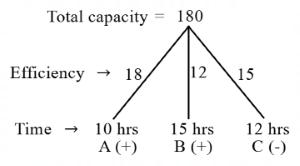Answer & Solution
Answer: Option A
Solution:

According to question,
Efficiency of (A + B) = 18 + 12 = 30 litre/hr
In 5 hrs, filled capacity by (A + B) = 30 × 5 = 150 litres
∴ Remaining capacity = 180 - 150 = 30 litres
Total efficiency of (A + B + C) = 18 + 12 - 15 = 15 litre/hr
∴ Time taken by (A + B + C) to fill the remaining capacity
$$ \Rightarrow \frac{{30}}{{15}} = 2\,{\text{hrs}}$$
∴ Required time, to fill the complete tank = 5 hrs + 2 hrs = 7 hrs
